Edit 7/11/2017 – This car is back on the market from the same seller with a reserve auction
Vuarnet shirt, stone-washed high-wasted jeans, neon Wayfarers, legwarmers, Wham!‘s “Make It Big” album playing on your Walkman, a tennis lesson scheduled for later in the day with someone named Chad, Tad or Chaz, and a BMW 3-series; they’re immediately identifiable as a product of the 1980s, even if in this case they were made in the late 1970s. Take a moment to consider the seats in this Alpina; made by Recaro, they’d look as at home on Bill Cosby’s back as he lectured Theo as they would on the race track. But just as those trends from the 80s have been revisited by the “Hipsters” of today, there’s another class I’ve dubbed “Yupsters”, wishing to relive the glory of Wall Street and every club from the Breakfast to the Country. They’re interested in the BMW 3 series, and the major resurgence of the small executive sedan has become ironic in its own right, from the “Respect Your Elders” stickers plastered on cars not much older than the creatures driving them (who, even more ironically, typically don’t know much about history), to the hypocrisy of everyone being different by all owning E30s. The only things missing from the entirely predictable plotline are a Harold Faltermeyer soundtrack and a cameo at the local show by Steve Guttenberg. To me, the 3 series that comes out of all of this smelling like roses is the E21; relatively forgotten and overlooked due to less availability, sport and cliche, a turned up E21 is nonetheless a beautiful thing when properly done:
CLICK FOR DETAILS: 1979 Alpina B6 2.8 on eBay
Year: 1979
Model: B6 2.8
Engine: 3.5 liter inline-6
Transmission: 5-speed manual
Mileage: 40,000 mi
Price: $32,500 Buy It Now
Alpina BMW’s are among the most collectible post war German cars and are rapidly increasing in value in today’s market. This unique example has the further distinction of increased power and performance beyond what even Alpina envisioned at the time- although they did install an M30 in the E30 a few years later, called the 333i, most of which were sent to South Africa for racing.
This car will make a nearly unbeatable track car as well as a great car for the show or touring circuit.
BMW E21 is the body designation for the first BMW 3 Series compact executive car, produced by the German automaker BMW from 1975 to 1983. This series was the immediate successor to the BMW 2002 and was superseded by the BMW E30.
Paul Bracq, Director of Design at BMW from 1970 to 1974, is credited with setting the design direction of the E21 3 Series, while Wilhelm Hofmeister is credited with first drawing the small forward wedge at the base of the C-pillar, a strong design trait of the first Three-series. In 1975 Claus Luthe replaced Bracq and became the owner of the project. In July 1975, BMW’s Board of Management first presented this new model series in the Munich Olympic Stadium for public appraisal. The frontal view of the new car was dominated by the BMW trademark kidney grille standing out clearly from the radiator cover. The styling of the new car bore a resemblance to the BMW E12 5 Series. The wedge shape of the two-door model was distinctive, extending all the way to the unusually high rear end. The suspension incorporated rack and pinion steering and MacPherson strut suspension at the front, and semi-trailing arm type independent suspension at the rear. The power assisted brakes were discs on the front wheels, while the rear wheels had drum brakes. Initially, a Getrag four-speed manual was the standard transmission fitment. Five-speed overdrive Getrag gearboxes were fitted as standard in 1980, but close ratio ‘sport’ gearboxes were available at the car’s release as an option. Alternatively, purchasers could opt for the ZF 3 HP-22 three-speed automatic transmission. The cockpit design of the E21 marked the introduction of a new design concept, with the center console and central dashboard area angled towards the driver. This feature has become part of BMW’s interior design philosophy for many years. As a sign of passive safety, all edges and control elements within the interior were rounded off and padded.
Alpina Burkard Bovensiepen GmbH is an automobile manufacturing company based in Buchloe, Germany selling their own cars, based on BMW cars. Alpina works closely with BMW and their processes are integrated into BMW’s production lines, thus Alpina is recognized by the German Ministry of Transport as an automobile manufacturer, in contrast to other performance specialists which are aftermarket tuners.
One of the first Alpina cars was the B6 based on the E21 with only 533 units produced over a 6 year period. This car, #66, was brought stateside by a returning serviceman, but unfortunately had a blown engine. Following suit with many European Alpina enthusiasts, the original engine was replace with a Metric Mechanics M30 3800 Rally engine producing 285 HP, a lightened flywheel and HD clutch and pilot bearing, and short shifter kit. The car was completely restored from the ground up, and painted in a very striking Dark Blue Metallic. The original Alpina interior was of course retained.
Alpina BMW’s are among the most collectible post war German cars and are rapidly increasing in value in today’s market. This unique example has the further distinction of increased power and performance beyond what even Alpina envisioned at the time- although they did install an M30 in the E30 a few years later, called the 333i, most of which were sent to South Africa for racing.
This car will make a nearly unbeatable track car as well as a great car for the show or touring circuit.
Minus the tacky stickers, this E21 is certainly good looking; the dark blue is very pretty and sets off the classic Alpina wheels well. Euro bumpers are beautiful too, making the clean Bracq design really show through. This is a mini 6-series for all intents and purposes, and slimmed down it certainly looks the part. But, there are some problems in terms of value. First off, the E21s haven’t been as desirable as the E30 models, for the reasons stated above. The asking price, at $32,500, is around what we’ve seen for asks on other later Alpina models, but typically it takes something really special to make it worth that amount. Second, the rear spoiler is missing; originally, the car would have sported a big rubber wedge spoiler, just like the bigger brother models did. Third, number 66 does appear in the Alpina Archives – and it is listed as being in the U.S.; however, the color is listed as “brown” though there’s no photo. So, it may not be the original paint – which could explain the lack of the typical Alpina stripes. However, not all E21s sport them, so it’s possible they weren’t selected and this is the original paint (or color) – if it was a respray, they went through a lot of effort because the presentation is very good overall. Next, the original motor is gone, replaced by an admittedly more powerful Metric Mechanics motor; but the value to me would be more in having an original mill in there. Lastly, those Cosby-colored Recaros; it’s unusual, but not unheard of, to have Recaro cloth in the E21s. But, the color pattern seems to be a later pattern than when the car would have been produced – and it’s unique among the E21s listed in the Alpina Archives. Some documentation – or period pictures – of the car in this configuration would go a long way to helping the value. Now, that said, it’s still a really cool bit of kit and a great way to stand out in the BMW crowd; I’m just not sure the higher value is backed up by a faultless history in this case.
-Carter
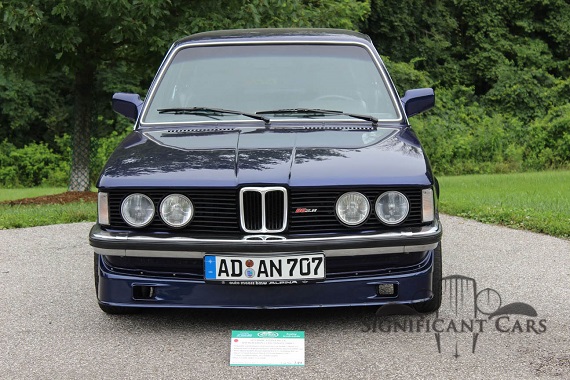
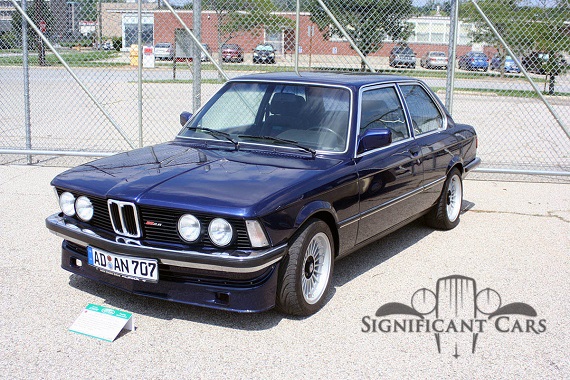

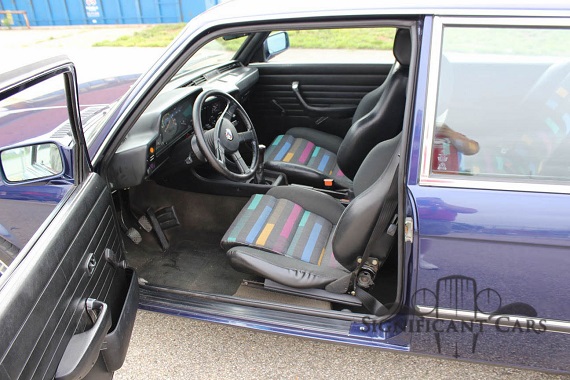
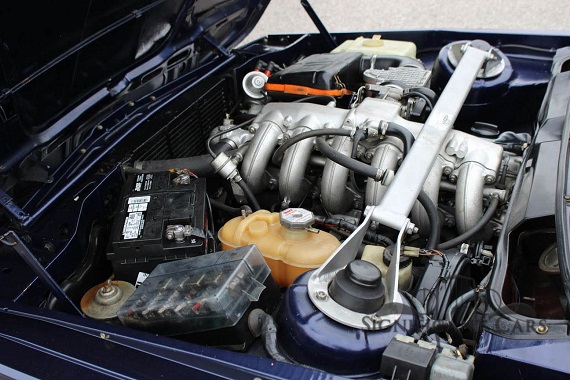

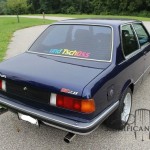




Lots to like about this car, but many things are not period correct. In addition to the items mentioned by Carter, the steering wheel is not correct for the late 1970s. The metal in the trunk should match the exterior color of the car, but I seriously doubt this car was flat black from the factory.
It may indeed have been an Alpina car at the start. With so many deviations from that point, you have to start wondering at what point does it stop being an Alpina and start being just a modified E21?
I’ll bet this thing is a blast to drive, but I’m not sure it’s a $33k blast.
How absolutely douchey to put stickers on this car. People are bloody insane.